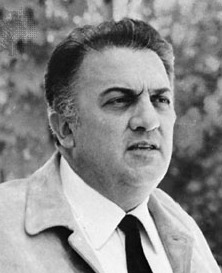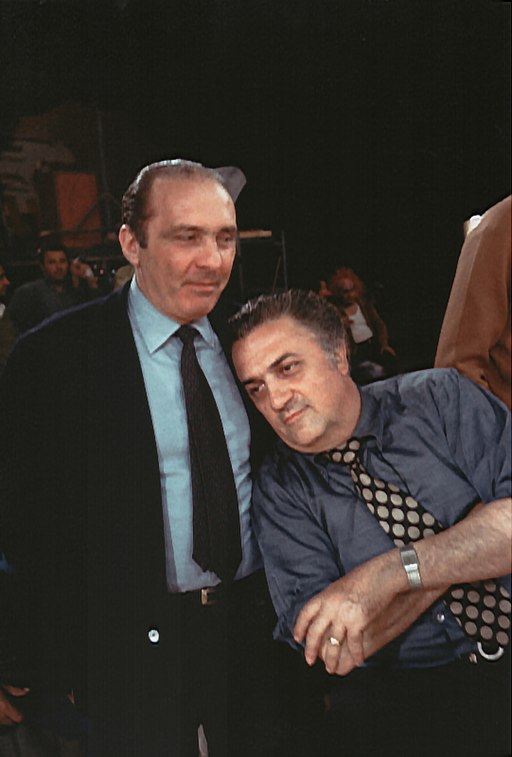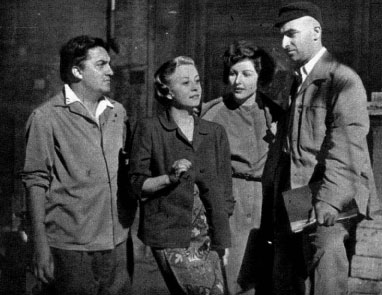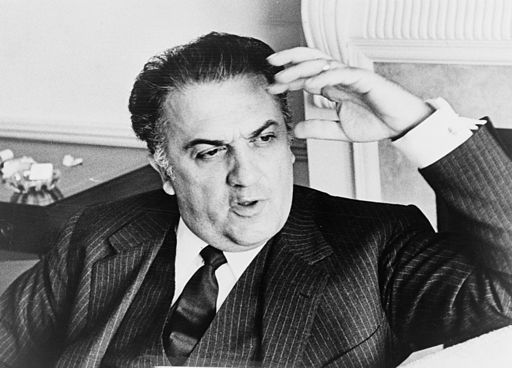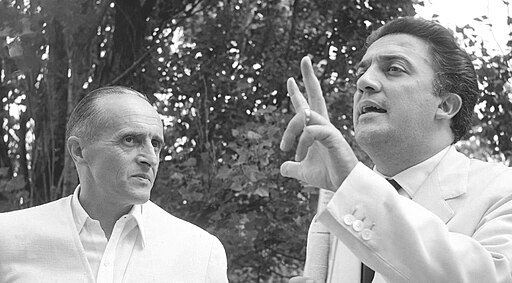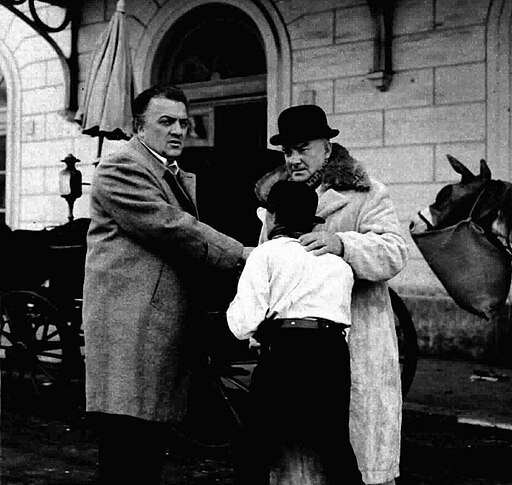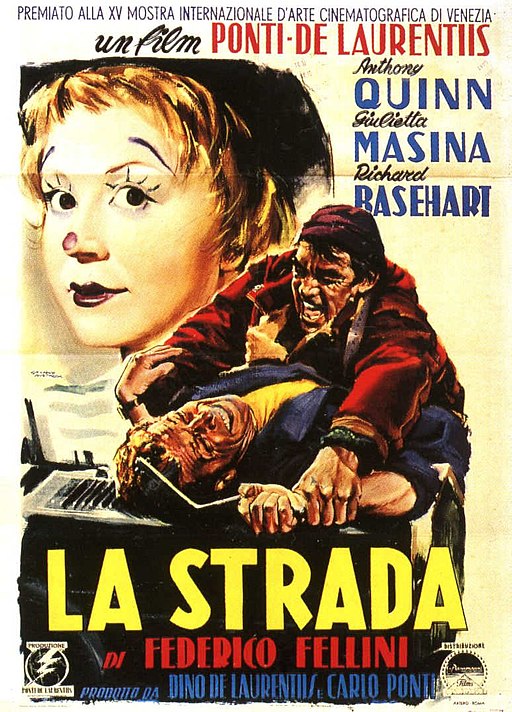Federico Fellini
back| Full Name | Federico Fellini |
| Born | January 20, 1920 |
| Birthplace | Rimini, Emilia-Romagna, Italy |
| Died | October 31, 1993 |
| Buried | Fellini's ashes were placed in a family tomb in Rimini, Italy |
| Married to | Giulietta Masina (1943 until his death in 1993) |
| Children | Pier Federico, who unfortunately died just a few weeks after his birth in 1945 |
| Notable films | La Strada (1954) - La Dolce Vita (1960) - 8½ (1963) - Amarcord (1973) |
Federico Fellini
The Maestro of Cinema, Master of Dreams
Federico Fellini's work is characterized by its blend of fantasy and baroque images, and he is considered one of the most influential filmmakers of the 20th century. His films often explore themes of memory, dreams, and the unconscious, and they frequently feature circus-like characters and surreal imagery.
Fellini's style has had a lasting impact on film and culture, and his works continue to be celebrated and studied for their artistic innovation and personal expression.
Related
Federico Fellini (1920 – 1993)
Biography and Overview of his Career
Federico Fellini, born on January 20, 1920, in Rimini, Italy, grew up in a picturesque coastal town in the Emilia-Romagna region. This setting, brimming with vibrant characters and carnivalesque scenes, would later heavily influence his cinematic style.
Early Life
Fellini's early life in Rimini was marked by a mix of whimsy and discipline. His father, Urbano Fellini, was a traveling salesman, which instilled in young Federico a sense of wanderlust and an appreciation for storytelling. His mother, Ida Barbiani, came from a more bourgeois background. Fellini's childhood was a blend of his father's roving spirit and his mother's structured nurturing, which later manifested in his films as a tension between fantasy and reality.
Education and Early Career
Fellini's formal education was somewhat sporadic and he was not particularly academic. Instead, he found his calling in the arts. In his teenage years, Fellini ran away to join a circus, but this adventure was short-lived. He soon discovered the world of theater and started his career as a caricature artist, which would influence his later film work, characterized by exaggerated characters and larger-than-life scenarios.
During World War II, Fellini moved to Rome, which became his lifelong home and the backdrop of many of his films. He initially continued his work as a caricature artist and also wrote for radio. It was during this period that he met and fell in love with Giulietta Masina, an actress who would become his lifelong muse and spouse.
Film Career
Fellini's entry into the world of cinema was as a screenwriter. His early work with Roberto Rossellini on films like "Rome, Open City" (1945) and "Paisan" (1946) was part of the Italian neorealism movement. However, Fellini's style evolved into a more personal and idiosyncratic form, deviating from neorealism's focus on the struggles of ordinary people.
His first solo-directed film, "Variety Lights" (1950), co-directed with Alberto Lattuada, set the stage for his unique style, blending fantasy and reality. It was with "La Strada" (1954), featuring Masina in a heart-rending role, that Fellini gained international acclaim. The film won the Oscar for Best Foreign Language Film, establishing Fellini as a major international filmmaker.
"La Dolce Vita" (1960), one of his most famous films, was a critical and commercial success. This film, depicting the hedonistic lifestyle of Rome's elite and the paparazzi who follow them, became iconic for its portrayal of post-war Italy and its critique of modernity and celebrity culture.
Masterpiece and Later Career
"8½" (1963), a semi-autobiographical film, is often considered Fellini's masterpiece. The film delves into the psyche of a director (echoing Fellini's own experiences) struggling with creative block. Its innovative narrative structure and visual style had a significant influence on global cinema.
In his later years, Fellini continued to make films that were personal and stylistically bold. "Amarcord" (1973), a nostalgic look at his youth in Fascist Italy, was another critical success and won an Academy Award for Best Foreign Language Film.
Personal Life and Legacy
Fellini's marriage to Giulietta Masina was a major influence in his life and work. The couple's relationship, though fraught with Fellini's infidelities, was deeply collaborative. Masina starred in several of his films, and their professional partnership was integral to both their careers.
Fellini's health began to decline in the late 1980s, and he passed away on October 31, 1993, in Rome. He left behind a legacy that reshaped the landscape of international cinema. His films are renowned for their blend of dreamlike imagery and earthy realism, a reflection of his own life's journey from the small town of Rimini to the heights of global cinema.
Fellini's influence extends beyond the film industry; he has impacted the worlds of art, literature, and popular culture. His unique visual style, exploration of themes like memory, dreams, and the unconscious, and his ability to blend fantasy with a critical look at society remain unparalleled. Today, Fellini stands as a towering figure in the history of cinema, his name synonymous with cinematic genius and creativity.
Federico Fellini accepting the Oscar in 1964 for the Movie 8½:
Analysis of Fellini’s Style of Direction:
Federico Fellini's directing style is distinctive and highly influential, marked by a blend of fantasy, baroque visuals, and a deep exploration of personal and societal themes. Here's an analysis of key aspects of his style:
A] Dreamlike and Surreal Imagery:
- Fellini often blurred the lines between reality and fantasy. His films are known for their dreamlike sequences that seamlessly integrate with the narrative, creating a surreal, almost hypnotic experience.
- This surreal approach is evident in films like "8½" and "Juliet of the Spirits," where the line between the protagonist's imagination and their reality is often blurred.
B] Autobiographical Elements:
- Many of Fellini's films contain autobiographical elements. He frequently drew upon his own life experiences, from his childhood in Rimini to his encounters in the world of cinema.
- "Amarcord," for instance, is a nostalgic look back at his youth in a small Italian town during the Fascist regime.
C] Unique Characters and Caricatures:
- Fellini had a fascination with unique, often bizarre characters. His films are populated by a wide range of eccentric, larger-than-life figures, which he often developed from his early career as a caricature artist.
- This is evident in "La Dolce Vita" and "Nights of Cabiria," where the characters, though exaggerated, are deeply human and relatable.
D] Exploration of Themes:
- His films frequently explore themes such as memory, sexuality, desire, and the absurdity of modern life.
- In "La Dolce Vita," Fellini critically examines the hedonistic lifestyle of Rome's elite, while "8½" delves into the complexities of creativity and artistic block.
E] Innovative Narrative Structure:
- Fellini often eschewed traditional narrative structures for a more episodic approach. His films might not follow a straightforward plot but rather a series of vignettes or dream sequences that collectively paint a larger picture.
- "Fellini Satyricon" and "Roma" are examples of this non-linear, episodic narrative style.
F] Visual Style and Cinematography:
- His visual style is marked by elaborate set designs and innovative use of color. He worked closely with cinematographers to create visually stunning and stylistically bold films.
- The use of vibrant colors in "Juliet of the Spirits" and the striking black-and-white contrasts in "8½" demonstrate his attention to visual composition.
G] Collaborations with Composers and Actors:
- Fellini's collaboration with composer Nino Rota created some of the most memorable film scores in cinema, significantly contributing to the atmosphere of his films.
- He also had a knack for cultivating deep and enduring collaborations with actors, particularly Giulietta Masina, his wife, who starred in many of his films.
H] Reflection on Society and Culture:
- While deeply personal, Fellini's films also reflect on broader societal and cultural themes. He often critiqued contemporary social norms, the celebrity culture, and the alienation of modern life.
- This societal reflection is particularly evident in "La Dolce Vita" and "8½."
I] Symbolism and Metaphor:
- Fellini frequently employed symbolism and metaphor in his films, using visual and narrative elements to suggest deeper meanings and themes.
- For instance, the recurring motif of the sea in his films often symbolizes life, mystery, and the subconscious.
Awards and Recognition:
Federico Fellini, one of the most celebrated filmmakers in the history of cinema, received numerous awards and nominations throughout his illustrious career.
Academy Awards (Oscars):
Best Foreign Language Film Wins:
- "La Strada" (1956)
- "Nights of Cabiria" (1957)
- "8½" (1963)
- "Amarcord" (1974)
Best Director Nominations:
- "La Dolce Vita" (1961)
- "8½" (1963)
- "Amarcord" (1974)
- "Fellini's Casanova" (1976)
Best Original Screenplay Nominations:
- "8½" (1963)
- "Amarcord" (1974)
Honorary Award:
- In 1993, Fellini received an honorary Oscar "in recognition of his cinematic accomplishments that have thrilled and entertained worldwide audiences."
Cannes Film Festival:
- Palme d'Or Nominations:
- "La Dolce Vita" (1960)
- "8½" (1963)
- Grand Prix (now Palme d'Or) Win:
- "La Dolce Vita" (1960)
- Best Director Award:
- "8½" (1963)
Venice Film Festival:
- Silver Lion Win:
- "La Strada" (1954)
- Career Golden Lion:
- Awarded in 1985 for his lifetime achievements.
Berlin International Film Festival:
- Silver Bear for Best Director:
- "La Dolce Vita" (1961)
David di Donatello Awards (Italian Film Awards):
- Fellini won several David di Donatello awards, including Best Director for films like "City of Women" (1980) and "And the Ship Sails On" (1983).
BAFTA Awards:
- Best Film Nomination:
- "La Dolce Vita" (1961)
- Fellini Satyricon:
- Nominated for Best Production Design and Best Costume Design.
Nastro d'Argento (Silver Ribbon) Awards:
- Won multiple Nastro d'Argento awards, given by the Italian National Syndicate of Film Journalists, for Best Director and Best Original Story for various films.
Other Honors and Recognitions:
- Fellini's films have been recognized and awarded at numerous other international film festivals and organizations throughout his career.
- He also received numerous honorary degrees and accolades for his contributions to cinema.
Notable Quotes from Federico Fellini:
On Imagination and Reality:
- "There is no end. There is no beginning. There is only the infinite passion of life."
- "All art is autobiographical; the pearl is the oyster's autobiography."
On Cinema and Storytelling:
- "A good opening and a good ending make for a good film provide they come close together."
- "Cinema is an old whore, like circus and variety, who knows how to give many kinds of pleasure."
On Dreams and Fantasy:
- "Talking about dreams is like talking about movies, since the cinema uses the language of dreams; years can pass in a second and you can hop from one place to another."
- "The visionary is the only realist."
On Life and Art:
- "Life is a combination of magic and pasta."
- "You have to live spherically – in many directions. Never lose your childish enthusiasm – and things will come your way."
On the Creative Process:
- "I don’t believe in total freedom for the artist. Left on his own, free to do anything he likes, the artist ends up doing nothing at all."
- "Even if I set out to make a film about a fillet of sole, it would be about me."
On Memory and Nostalgia:
- "The only real autobiographical element in my films is the feeling of nostalgia, the regret and the sense of loss for things past."
- "Nostalgia is an illness for those who haven't realized that today is tomorrow's nostalgia."
On Society and Culture:
- "It's easier to be faithful to a restaurant than it is to a woman."
- "Money is everywhere but so is poetry. What we lack are the poets."
Movies Directed by Federico Fellini:
- "Variety Lights" (1950, co-directed with Alberto Lattuada): An aspiring actress joins a traveling theatrical troupe and experiences the hardships and illusions of show business.
- "The White Sheik" (1952): In this comedy, a newlywed woman sneaks away from her husband to meet her idol, a photo-novel actor known as the "White Sheik," leading to a series of misadventures.
- "I Vitelloni" (1953): This film follows the lives of five young men idling in a small, provincial Italian town. It's a poignant look at lost youth and dreams.
- "La Strada" (1954): This drama tells the story of a naïve young woman sold to a brutish strongman in a traveling circus and their tragic relationship.
- "Il Bidone" (1955): A group of small-time swindlers struggle with their consciences and the consequences of their scams on their victims.
- "Nights of Cabiria" (1957): This film centers on a kind-hearted but naive prostitute in Rome who continually seeks, but fails to find, true love.
- "La Dolce Vita" (1960): A landmark film exploring the "sweet life" of Rome's high society through the eyes of a disillusioned celebrity journalist.
- "8½" (1963): This highly influential film delves into the mind of a director grappling with creative block, blending reality and fantasy.
- "Juliet of the Spirits" (1965): A visually rich film about a woman who, after discovering her husband's infidelity, embarks on a journey of self-discovery, guided by visions and spirits.
- "Fellini Satyricon" (1969): An adaptation of Petronius's work, this film is a surreal, episodic journey through ancient Rome, following two students and their adventures.
- "The Clowns" (1970, TV movie): Part documentary, part fantasy, this film reflects on the role and cultural image of clowns.
- "Roma" (1972): A tribute to the city of Rome, mixing autobiographical elements with fantasy sequences and historical vignettes.
- "Amarcord" (1973): A series of comedic and nostalgic vignettes based on Fellini's own childhood memories of life in a small Italian town under fascism.
- "Casanova" (1976): A stylized account of the famous seducer's life, showcasing his adventures and misadventures across Europe.
- "Orchestra Rehearsal" (1978, TV movie): A metaphorical story set in an orchestra rehearsal, reflecting on the chaotic nature of Italian society.
- "City of Women" (1980): A surreal exploration of male fantasies and fears about women, following a man's journey through a feminist dystopia.
- "And the Ship Sails On" (1983): Set in 1914, this film follows the journey of a luxury liner filled with the remains of a famous opera singer and a mix of her friends and admirers.
- "Ginger and Fred" (1986): A pair of retired dancers, who once specialized in imitating Ginger Rogers and Fred Astaire, reunite for a television show, reflecting on their past and present.
- "Intervista" (1987): A film about filmmaking, blending reality and fiction, as Fellini stages an interview and gives a behind-the-scenes look at his creative process.
- "The Voice of the Moon" (1990): Fellini's last film, a dreamlike narrative following the wanderings of a recently released mental patient and his friend in a surreal rural landscape.

